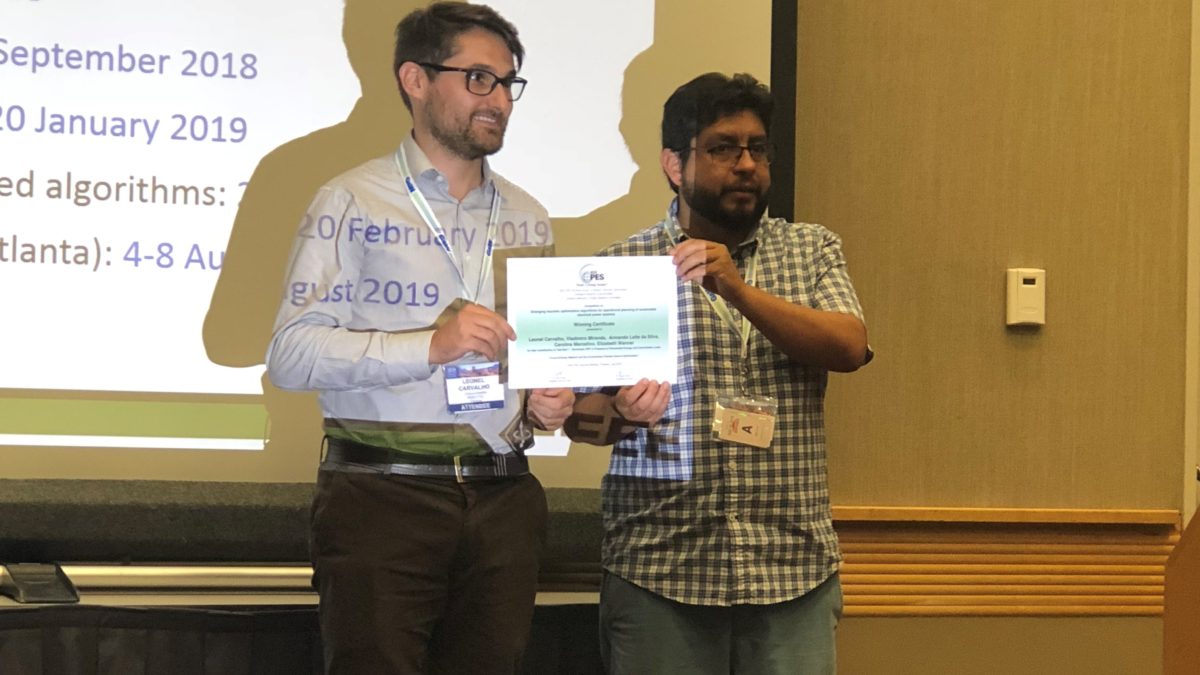The Portuguese science and research community shows the World the excellent quality of the Portuguese scientists and engineers.
Leonel Carvalho an IEEE Affiliate member and Vladimiro Miranda an IEEE Fellow member, of the IEEE Portugal Section, both researchers of the Institute for Systems and Computing Engineering , Technology and Science (INESC TEC), won with their team this year’s edition of the “Modern Heuristic Optimization” competition, an engineering competition organized by the IEEE. It is the third time that the two Portuguese researchers win this international competition, repeating the victories of 2014 and 2017.
Vladimiro Miranda originally designed the optimisation method entitled EPSO (Evolutionary Particle Swarm Optimization), which was promoted in INESC TEC by Leonel Carvalho, researcher of the Centre for Power and Energy Systems (CPES). EPSO is a method based on a hybrid of two established optimization techniques belonging to the meta-heuristic family: evolutionary computing and particle swarm optimization. DEEPSO is a high-performing variant of EPSO that includes a sampling mechanism inspired in Differential Evolution.
IEEE Region 8 Today had the chance to speak with Leonel Carvalho and further learn about this competition and their success.
Can you describe to our readers what was the competition about?
The competition organized by the Working Group on Modern Heuristic Optimization under the IEEE PES Analytic Methods in Power Systems Committee, which is currently in its third edition, aims at promoting the use and evaluating the performance of emerging optimization tools based on computational intelligence. These alternative methods have the ability to tackle and find very good solutions for complex optimization problems in power systems that cannot be easily solved with traditional deterministic algorithms, such as the Interior-point method. Each edition of the competition has proposed a different set of complex optimization problems most of them belonging to the class of the optimal load flow problems. In order to promote a fair comparative analysis between competing methodologies, the optimization problems are made available in test beds that cannot be accessed nor modified by the competitors – there is only access to the performance of the solutions produced and the underlying constraints violations. Apart from the results produced, the competing teams must also submit their codes to be tested by the organization. It is indeed a very challenging competition.
You were challenged to solve two benchmarks problems related to renewable energy. What does this means?
The topic of this year’s competition was the operational planning of sustainable electric systems. Within this topic, two relevant problems were defined. The first one concerned the stochastic optimal load flow problem with renewable energy sources and controllable loads. The goal of this problem is the minimization of the expected operation cost considering the uncertainty of wind, solar and hydro power production and the possibility of making adjustments to the system demand. The second problem was quite similar to the first one. The only differences consisted on the type of control variables (replacement of controllable loads by electric vehicles) and on the periods to be optimized (six hours against one hour) making it considerably more difficult to find the optimal solution. These are real optimization problems faced by power system operators all over the world. In a sense, the competition allows to showcase a panoply of methodologies and their usefulness to deal with real problems.
3rd time winners! How do you feel about that? And how important is this for the Portuguese researchers community?
I am indeed very happy to have been part of the team won this competition, which is composed not only by me but also by other Portuguese and Brazilian researchers. The role played by each element was vital to achieve this success. It is also worth mentioning that the methodology used included a metaheuristic created at INESC TEC – the Evolutionary Particle Swarm Optimization method – which is the outcome of Vladimiro Miranda’s research efforts and his team, of which I am a proud member, since 2002. The success of this metaheuristic, which has been adopted by several researches worldwide, is an outstanding achievement for the Portuguese science and research community showing the World the excellent quality of the Portuguese scientists and engineers.
Compering with the previous participations in the competition, which was the most difficult?
I believe the 2017 competition was the most difficult one. In that year, we were only able to achieve the best result in one test bed out of the two proposed. Since there were two different winners for the two problems proposed in that year, we cannot truly say that we had won the 2017 competition. Anyway, we have been observing other teams competing with variants of our methodology in the last two editions, which makes us very proud.
This year’s competition focused on Renewable Energy. How important is the technological development on Renewable Energy?
Power systems have been evolving considerably over the last 15 years. We now observe a large penetration of variable renewable energy sources, which creates several challenges for the system operators to maintain the delicate balance between generation and demand. By having operational planning tools that consider the uncertainty of renewable resources, one can integrate and use even more renewable energy in a secure and economical way. Surely, some of the methodologies proposed in this competition will be available in control rooms in a near future.
Are you planning to compete again next year?
I really enjoy these type of challenges, so I will definitely participate.


Social Media